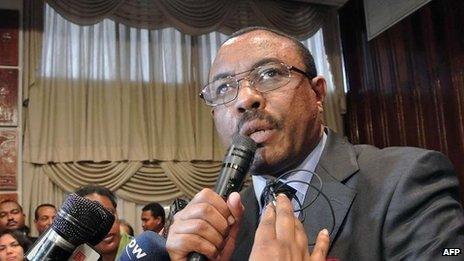Ethiopia: Parliament session on Meles succession delayed
- Published

Officials say the appointment of Deputy Prime Minister Hailemariam Desalegn is not in dispute
A special session of Ethiopia's parliament arranged in order to endorse the late Prime Minister Meles Zenawi's successor has been postponed.
No reason has not been given for the delay. But officials say the appointment of Deputy Prime Minister Hailemariam Desalegn is not in dispute.
Mr Meles, 57, died suddenly on Monday from an infection while being treated in hospital in Brussels.
His body has been lying in state at the national palace in the capital.
A state of national mourning has been declared but no date for the funeral has been set.
Mr Meles has been praised for bringing development and economic growth to Ethiopia, but critics say they came at the cost of respect for plurality and human rights.
He had not been seen in public for weeks before his death was announced, and there had been increasingly intense speculation about his health - though authorities insist he had been on the road to recovery when he was suddenly struck down by an infection.
There is still no confirmation of the details of his medical condition.
Mr Hailemariam was appointed deputy prime minister and foreign affairs minister in 2010.
State media say he will take over until elections in 2015.
The BBC's Peter Biles says there is intense interest about Mr Meles' succession, because he had been at the helm of Ethiopia's government for 21 years.
The Brussels-based think tank, the Crisis Group, has voiced concern about political transition in Ethiopia.
It says Mr Meles's successor will lead a weaker regime facing mounting grievances along ethnic and religious lines and a likely increase in radicalism.
World leaders have paid tribute to Mr Meles for leading Ethiopia to an impressive era of economic growth but human rights groups say the new leadership now has an opportunity to usher in a fresh spirit of political tolerance lacking during Mr Meles's rule.
Analysts point out that Ethiopia plays a key role in the Horn of Africa, not only facing down its own rebels fighting for greater autonomy in the south-eastern ethnic Somali region, but supporting the fight against al-Qaeda linked al-Shabab rebels in Somalia.
Mr Meles also carved out a major role for himself in Africa and internationally, mediating in the conflict in Sudan and South Sudan and taking a leading position in the African Union, which is headquartered in Addis Ababa.
- Published22 August 2012
- Published21 August 2012
- Published21 August 2012
- Published21 August 2012